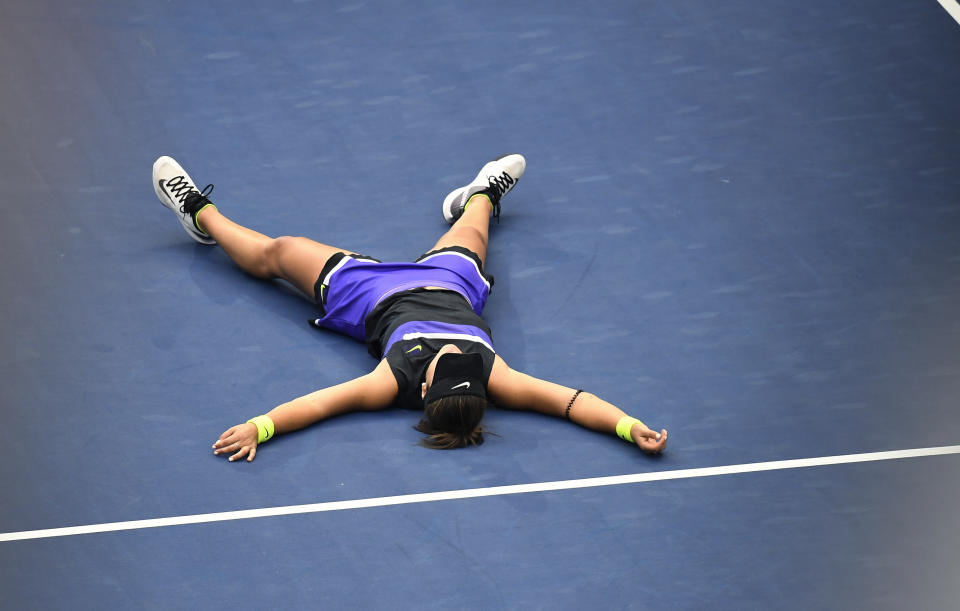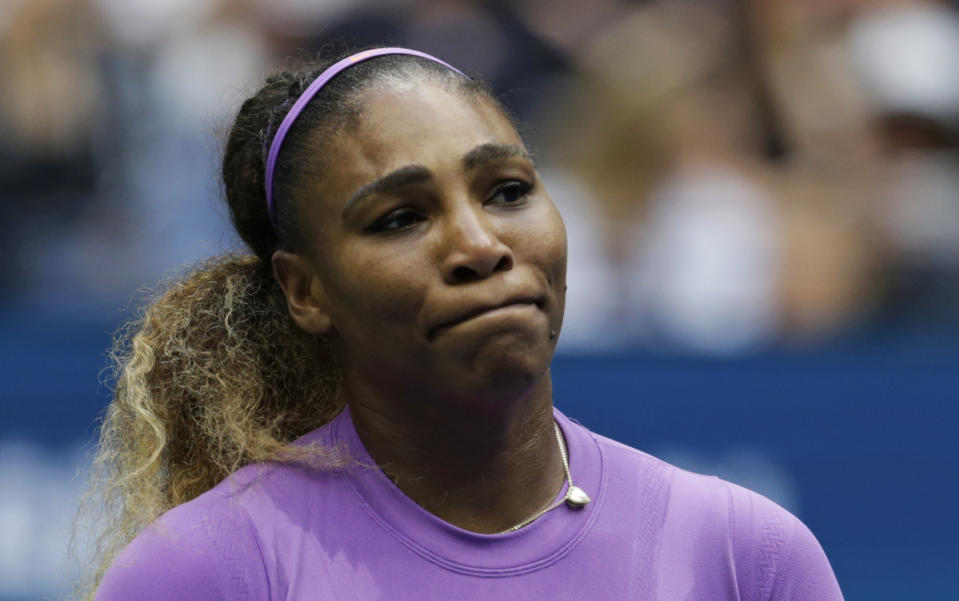Serena Williams can’t overcome youth of Bianca Andreescu

NEW YORK – Bianca Andreescu dropped to her knees, kissed the hard court, and then rolled over onto her back, her hands over her face. She remained in that position for about 20 seconds.
That’s how you react when you have vanquished a lion.
Or, defeated a champion like Serena Williams, a player who has won more Grand Slam finals than you have lived years, and who won this very tournament not only before you were born, but before you were even conceived.
The record will say that Andreescu, a 19-year-old from Missisauga, Canada, defeated Williams, a 23-time Grand Slam champion, in straight sets, 6-3, 7-5, in the 2019 U.S. Open women’s singles final. But that will not even begin to tell the story of what happened over 100 intense minutes at Arthur Ashe Stadium on Saturday.
In one sense, Andreescu’s victory was a story that has been told repeatedly over the history of just about every sport. At some point, no matter the résumés of the players or their comparative strengths, a natural progression takes over. The young overpower the old. The strong devour the weak.
In a nutshell, that is what Andreescu did to Williams, presenting her with a virtual mirror image of herself, only younger, stronger, faster and hungrier.
But in another sense, the match was a struggle between a proud older champion trying desperately to recapture her past against a fast-rising youngster eager to begin her future.
The two had met in the Canadian Open a month ago, a match Andreescu won when Williams retired after just four games with back spasms. That one proved nothing. This one exposed nearly everything.
“I was just trying to stay out there a little bit longer,” Williams said. “The fans were cheering so hard it just made me play a little bit better, fight a little bit more.”
True, the sellout crowd at Ashe was vociferous in its support for Williams, who was trying, once again, to match the record of 24 career Grand Slam final victories set by Margaret Court between 1962 and 1973.
From the first sighting of Williams heading toward the court on the overhead video screens, the crowd noise would have blown the roof off the place if the roof hadn’t been open.
And never was it louder than in the seventh game of the second set, when Williams, down 5-1, was facing bitter defeat in a slam for the fourth time in a row. At one point, the crowd was so deafening Andreescu tried to shut it out by sticking her fingers in her ears.
“I could barely hear myself think,” she said.
It was as if the crowd was trying to will Williams to the victory that has eluded her for so long; Williams has been chasing Court, and history, for more than two years now, since winning the 2017 Australian Open in early pregnancy, after which she took time off to have her daughter.
And for a time, it worked. Williams battled back from match point to break Andreescu in the seventh game, and again in the ninth to pull within one game. When she held serve in the next game to even the match, it appeared that the glue that had been holding Andreescu’s game together was beginning to fail.

Suddenly, it was the younger woman who was making unforced errors, who was hitting easy returns into the net, and the older one who was serving as if the clock had been rolled back 10 years. One of Williams’ serves hit 120 miles per hour, nearly 10 mph harder than anything Andreescu could muster up.
Whether it was fatigue, nerves, or the sudden realization of just what she was trying to do and who she was trying to beat, Andreescu seemed incapable of closing the show.
But the monumental effort it took for Williams to climb back into the match virtually assured that she could not win it. Over the final two games, Williams’ purple dress was drenched in sweat, her back was hunched and her legs sometimes appeared to be mired in wet concrete.
Andreescu won the final two games fairly easily, breaking Williams in the last one to finish her off.
“It definitely wasn’t easy, especially when she started coming back in the second set,” Andreescu said. “She’s a champion and that’s what champions do.”
Williams, disappointed in defeat, found it nearly impossible to give full credit to her opponent. “I love Bianca, I think she’s a great girl,’’ Williams said. “But I think this was the worst match I’ve played all tournament. I honestly don’t think Serena showed up today.”
Williams started the day well, with an ace on her first serve of the match, but the final numbers pretty much told the story: she double-faulted eight times to Andreescu’s three, made 33 unforced errors to Andreescu’s 17, and put only 44 percent of her first serves in play. After being broken just three times in her first 54 games of the tournament, Williams was broken six times Saturday. And the player who lost only one game in crushing Qiang Wang in the semifinal lost the first two games of the final to Andreescu.
“How do I play at a level like this in a final?” Williams mused to herself.
As a result, the crowd, which had come to witness history, saw history of a different kind. Andreescu, who has enjoyed a meteoric rise over the past year, soaring from 208th in the world last August to No. 15 here, became the first Canadian ever to win a singles major.
And with the exception of her rocky moments in the second set, Andreescu went about her business free of nerves, awe or respect for her elders. In fact, she used a word often associated with Williams to describe her success in the first two games of the match.
“I think she was a little intimidated by it,” Andreescu said.
The strategy, Andreescu said, was to make Williams’ age work against her. “The game plan right from the start was to make her work for every ball,” she said.
And with the brashness of youth, Andreescu described her thoughts as the match seemed to be slipping away from her thusly: “I just told myself to put the goddamn ball inside the court.”
It was no doubt the way a younger Williams would have thought in a similar spot. But, 19 days shy of her 38th birthday and nearly a quarter-century after her pro debut, Williams’ body and mind are trains moving in opposite directions.
Still, the old champion retains an indomitable will to win, even if her body can no longer keep up its end of the bargain.
Asked if she was at a point in her career where an appreciation of past accomplishments could assuage present-day disappointments, Williams shook her head.
“Maybe in like 20 years, I’ll think, ‘Hey, I wasn’t so bad,’” she said. “But it’s really hard in the moment to take this and say, ‘It just didn’t work out for you today.’”
Spoken like countless old champions throughout sports history.
But even the greatest champions eventually must come to grips with the fact that their time is just about up.
More from Yahoo Sports:

